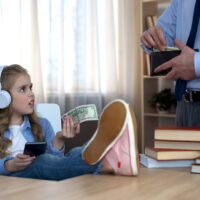If your kids are anything like mine, chances are they can destroy a room in a half-hour (or less). Even though getting your child to clean their room after may sound like a hassle, it’s a big step in personal responsibility that your child should take as they get older. Below, you’ll find the best strategies on how to get your kid to clean their room so clean up time isn’t such a fuss.
Develop a System and Create a Checklist
One of the reasons that younger kids might resist cleaning their room is because they aren’t sure where to start. When kids are younger, you should help them clean their room. Come up with a checklist of items that they should do each time they start cleaning up. For example, some tasks might include putting toys where they go, putting away clean clothes, picking up dirty clothes and putting them in the laundry basket, making the bed, throwing out trash, and sweeping or vacuuming the floor.
Something that can be helpful for kids is creating a checklist. When you create a checklist, you’re setting expectations for what constitutes a “clean” room. You’re also giving your child a visual representation of what they need to do, so it is easier for them to get started.
If you want, you can create a laminated checklist that works with dry-erase markers. That way, your child can mark off what they need to do over and over again. Don’t worry if your child can’t read yet either. You can just as easily make a checklist that uses pictures instead.
Help the First Few Times
When your child is young, helping them clean their room may get them on the right track. When you do help, use the checklist you created and come up with a system that works well. Show your child that when their room is maintained, it hardly takes any time at all the clean up. Additionally, this helps them develop a cleaning routine so they aren’t as intimidated tackling the job themselves in the future.
Keep in mind that actively helping your child is not the same thing as supervising them. Work together on the room and remember that you’re tackling a new activity together. Give gentle guidance and advice rather than becoming frustrated and don’t set your expectations too high. Once your child no longer has to be guided through each step, you can help make cleaning a little more fun by putting on some music and having a dance party while you clean.
Don’t Over Clutter
In my household, holidays are hard for clutter. The kids have all kinds of new things, plus everything they always had. It’s especially hard because their birthdays are toward the end of the summer, just a few months before it is the gift-giving season again.
Pair Down Toys/Clothes
You should encourage your child to pair down their toys over time. One way to offer an incentive is to have a yard sale and let your child keep the money from the things that they sell. You could also consider donating the toys that are in better condition. If you choose to do this, reassure your child that they are going to make another kid really happy.
The same strategy goes for clothing, games, crafting supplies, or anything else that seems too cluttered. Your child doesn’t need a t-shirt for every day of the year or books that they haven’t read in over six months. If there are things you don’t want to get rid of, putting them in a box for later. Something I do with my kid’s toys is cycle them out every six months or so I switch out some of their current toys with ‘new’ ones from the garage. This is also great for books they aren’t yet interested in.
RELATED: How to Organize Your Baby’s Clothes
The One-for-One Rule
For some families, a one-for-one rule is also effective. Basically, when your child buys a new toy, book, or piece of clothing, they have to get rid of one similar item. This method doesn’t work for all families, but if it does it’s a great way to keep clutter down in your child’s room.
Offer an Allowance
While having a clean room is a reward on its own, it may be helpful to offer your child an allowance. It can be as much as you want, anywhere from a few dollars to ten or more dollars each week. This might increase/decrease your child’s responsibilities. Some parents even offer bonuses for going above and beyond or doing extra chores, like weed eating.
Something else that might be helpful is using your child’s allowance to discourage behaviors you don’t want them to do. For example, impose a small fee for toys that are left on the staircase, food dishes left in the room, or candy wrappers on the floor.
Lead by Example
Kids learn a lot from the people around them. If parents or older siblings aren’t picking up after themselves, then younger kids are likely to get in the habit of leaving their things out, too. It’s important that you and your older children model the behaviors you expect from the younger ones. You can even encourage your child to help you, so they’re ready to tackle age-appropriate chores as they get older.
Something else that you can do is have everyone participate when it’s time to clean. Have everyone set an alarm for 15 minutes and choose a room of the house to work on. Everyone in the family pitches in and everyone gets to reap the benefits of a cleaner house.
Explain Why it’s Important to Clean
Maintaining a clean standard of living is important for health reasons. Unwashed dishes and uneaten food contributes to mold growth, rodents and bugs, and more. A floor covered in toys is a tripping hazard, especially if your child can’t easily get to their doorway in an emergency. Young kids are often able to understand how germs work, especially after they’ve learned about the importance of washing their hands. Reinforce these ideas by reminding your child why it is important to keep things tidy.
RELATED: How to Teach a Child to Blow Their Nose
Don’t Use Cleaning as a Punishment
Having a system of rewards and punishments is a good way to offer balance and teach your child right from wrong. If you use cleaning as a form of punishment, your child is going to have negative feelings about it. This discourages them from wanting to clean in the future. It’s much better to consider cleaning and all of its benefits. A clean room helps your child know where all of their things are. Another benefit is that there’s more space for running around and having fun.
RELATED: How to Discipline a 1-Year-Old
Be Realistic About Expectations
Nobody is perfect – not even adults. We’ve all missed a spot on a dish or left behind dust in a corner while sweeping. When your child is cleaning, don’t expect perfection. Expecting too much of your child makes cleaning stressful. Additionally, when you criticize your child, you are creating negative associations with cleaning instead of encouraging them to clean in the future.
When you do need to address the way something is done, take the time to do it with your child. Point out the things that they did right and be sure to mention how much you appreciated them helping out. Then, take the time to show them what they missed or how to do it in a better way.
Spread Chores Out
If your child comes home from school and has five or six chores to do in addition to their homework, it quickly starts to seem overwhelming. Something that is helpful when assigning chores is to limit it to 1-2 things per day (depending on the task). If you spread chores out across the week, your child is more likely to tackle them without becoming overwhelmed. As an added benefit, doing a little cleaning each day helps build a habit.
Encourage Regular Cleaning
While you don’t want to overwhelm your child without housework, it can be helpful to have them regularly clean for periods of 10-15 minutes throughout the day. This also helps stop rooms from getting too messy and making the cleaning process overwhelming.
One rule that we use at my house is picking up your toys before you move onto something else that is fun. This works especially well when it’s something that my children are excited about doing, like going to visit a relative or swimming at the beach.
FAQs – How to Get Your Kid to Clean Their Room
Should children have chores?
Yes, children should have chores. Doing something like picking up toys or sweeping the floor makes your child feel capable. It makes them feel as if they have a responsibility in the home and they experience a sense of satisfaction when they finish. Additionally, as your child sees everyone around the house working together and pitching in on chores, it teaches teamwork and collaboration.
Furthermore, the chores that your child learns now are likely things they’ll be doing for the rest of their life. When your child goes away to college or moves into their first apartment, they’ll know how to take care of their home and themselves.
Why doesn’t my kid want to clean their room?
Children may refuse to clean their room for a number of reasons. When your child is young, they might be overwhelmed by cleaning their room. As your child gets older, the resistance might come from an interest in doing something else. For example, they’d rather be playing video games or running around outside than cleaning their room. For teens, a resistance to clean may come from being unaware of their poor cleanliness habits. Some teens also struggle with depression, where they may lack the motivation to clean or feel they don’t deserve a clean room. The best thing you can do in any of these situations is to have an open discussion with your child about the problem, your expectations, and how you can arrive at a solution.
When should my child start cleaning their own room?
Most experts agree children are ready to start helping with cleanup by 1-2 years of age. They can help pick up toys, take plastic dishware and silverware to the sink, and put dirty clothes in the hamper. Having your child start helping when they are young reinforces cleanliness and creates good habits for in the future.
Should I make my teenager clean their room?
Think about how to get your kid to clean their room can be frustrating when you’re dealing with a teenager. It could be that your child is struggling with something or it could be that they are just claiming their room as their own. With teens, unfortunately, the more you push the more likely they are to push back.
You don’t have to force your teen to keep their room spotless. If you have reinforced cleanliness values when they were young, there are good chances that they will eventually bounce back and decide to start cleaning their room again on their own. Plus, if your teen lets laundry build up until they don’t have any clean shirts, maybe they’ll be more inclined to do their own laundry.
The exception to this rule is habits that are dangerous. For example, spilled drinks and food containers contribute to the growth of mold, bacteria, and gross smells. If there are any cleaning habits absolutely unacceptable, tell your teen what you expect. You could tell your teen they won’t be allowed to have food or drinks in their room if they can’t take their dishes and containers out periodically. In general, however, let them have freedom in their living space and keep it messy if they choose. If it really bothers you, close the door.
Final Word
Getting your child to clean their room sometimes feels like an uphill battle. Hopefully, these tips will help you with how to get your kid to clean their room. Even if they don’t seem to be working right away- be patient. With a little persistence, keeping a clean room will become a habit for your child.






